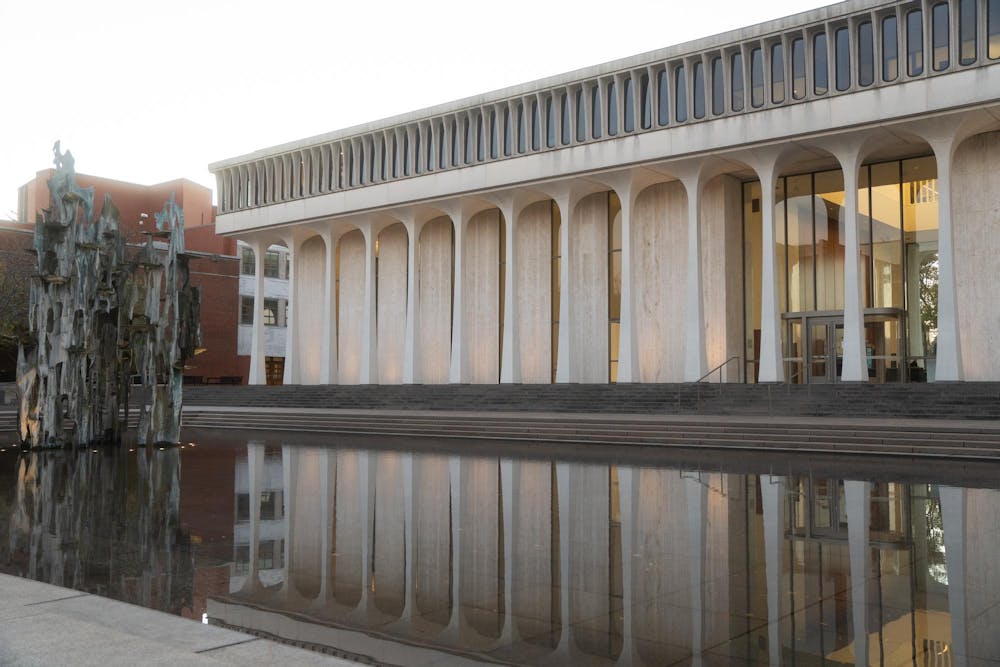In the upcoming Undergraduate Student Government (USG) election, two referenda may appear on the ballot.
Referenda are one of the major ways for Princeton students to express their concerns about a particular issue to administrators by petitioning their fellow classmates for signatures and securing votes. This process occurs in two ways: Individual sponsors can present referenda to USG, which requires signatures from 10 percent of undergraduates to get on the ballot. Alternatively, USG senators can sponsor proposals.
This year, one referendum was initiated by the USG senate and calls for the restoration of the independent dining option. This referendum is in response to the University’s recently announced dining plan changes, which requires students not affiliated with an eating club or co-op to be on, at minimum, a Block 128 meal plan.
The second referendum is student-initiated and sponsored by Charlie Yale ’28 on behalf of Sunrise Princeton. It calls for the University to stop investing in, providing, and receiving money from PetroTiger, a fossil fuel company that Princeton owns. Despite Princeton moving to divest certain fossil fuel companies subject to specific criteria in 2022, Sunrise Princeton released a report last year detailing that the University had sourced $140 million worth of earnings from PetroTiger. Yale is an assistant Opinion editor for The Daily Princetonian.
Both referenda were approved by USG in the Senate Referendum Language Review, which took place at the weekly USG meeting on Nov. 9. The deadline for referendum petitions is Friday, Nov. 14 at 5 p.m.
USG holds three election cycles each year in the fall, winter, and spring, but referenda only appear during the winter and spring cycles.
For student-initiated referenda, the referendum and its sponsor must go through a rules meeting and the language review, in which the senate approves the resolution and ballot question language. After the language review, the sponsor and petition helpers must collect signatures from 10 percent of undergraduates to get the referendum on the ballot. This year, 585 signatures are needed to meet this metric.
Signatures must be collected through one-on-one meetings. Door-to-door petitioning, as well as mass communications such as listserv emails, are prohibited. In contrast, amendments to the Honor Code Constitution need only 200 undergraduate signatures.

Senate-initiated referenda follow a very different procedure. The senate must pass a resolution in order to put a referendum draft, resolution, and ballot question on the ballot before the petition deadline for student-initiated petitions.
The senate can also initiate a referendum if it passes a resolution that calls for the referendum concurrent with that election cycle, specifies the ballot question and referendum resolution, and appoints an undergraduate student to sponsor the referendum.
Some referendum sponsors have expressed unhappiness with the petition process, particularly the high signature requirement student-initiated referenda must meet compared to Honor Code Constitution amendments.
“It is nearly impossible for one student to collect all 580+ signatures by themselves,” Yale wrote in a statement to the ‘Prince.’ “This feels like a blindspot in USG policy to me.”

In an interview with the ‘Prince,’ USG Chief Elections Manager Alex Sorgini ’26 said that the language surrounding the one-on-one petitions and Honor Code Constitution amendments have been “long-standing.”
“It used to be paper petitioning, so there just was no way to do mass petitioning,” Sorgini said. “When it moved over to digital, it was just that same style was adopted with the rule.”
The referendum that Yale is sponsoring is “advisory.” This means that the senate will officially act on the petition, write a position paper, send it to whomever the sponsor requests, and request a response back. The senate cannot force the University to respond, and the results of the referendum are not binding.
Last year, four referenda were passed. None have been implemented as a result of the referenda.
“Even though USG referenda are not binding and do not lead to immediate policy changes, I believe they are effective tools for measuring student body opinion and can provide additional context in policy discussions between student leaders and administrators,” said Vivian Bui ’26, who passed a referendum last year asking the University to allow students to Pass/D/Fail 100- and 200-level language courses that are taken in addition to the A.B. language requirement. Bui formerly served as chair of the USG Academics Committee.
“I do believe my referendum will provide the foundation for actual change, even if these changes happen well after I graduate,” Bui added.
USG tries not to have too many referendums on the ballot; if two referendum proposals have similar aims, Election Managers may ask one sponsor if they can share their name and proposal with the other sponsor.
Elizabeth Hu is a News contributor for the ‘Prince.’ She is from Houston, Texas, and can be reached at eh9203[at]princeton.edu.
Benedict Hooper is a News contributor for the ‘Prince.’ He is from Greenwich, Conn. and can be reached at bh3193[at]princeton.edu.
Please send corrections to corrections[at]dailyprincetonian.com.








